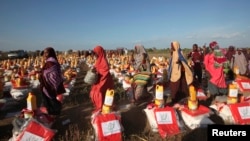GENEVA —
The U.N. refugee agency is appealing to countries not to deport Somali asylum seekers to their country of origin. The UNHCR says the situation in southern and central Somalia remains unsafe and Somalis fleeing those areas are in need of international protection.
According to UNHCR, security in some parts of southern and central Somalia has improved. But it says continued armed conflict and widespread human rights abuses is forcing many Somalis continue to flee the country.
Spokeswoman Fatoumata Lejeune-Kaba says civilians are suffering greatly from the conflict between the government and al-Shabab militants. She says southern and central Somalia remain very dangerous, and warns asylum seekers who are forcibly returned there risk persecution or serious harm.
“Monthly fatalities fluctuated between 100 and 600 people. In June last year, fierce fighting resulted in 314 casualties in Kismayo alone. Civilians are at risk of being killed or wounded in crossfire between government forces and al-Shabab militants as well as by bomb attacks and as bystanders in targeted attacks," she told reporters.
Lejeune-Kaba said there is a perception the situation in Somalia has stabilized because it no longer makes headline news.
She says since an internationally-backed government was established in 2012, many Somalis have returned from years abroad. They are setting up businesses and working to revive the failed economy.
“But unfortunately, on the ground, we went from a situation where there was open warfare between the government and al-Shabab forces to now, a situation where the al-Shabab tactic is sometimes to drop a bomb and to attack,: she explained. "So, there are incidents more than there is open war like we used to have and that puts people in danger. And, that is why we are continuing to see Somalis leaving.”
The UNHCR reports more than 42,000 Somalis sought asylum in neighboring countries and elsewhere last year, but many are sent home.
Lejeune-Kaba says Saudi Arabia recently deported a large number of Somali asylum seekers. Those who are forcibly sent back are not safe, she noted, especially if they are returned to territory under the control of al-Shabab.
Lejeune-Kaba adds that the militant group continues to commit gross violations of human rights. There are reports of peace activists, community leaders, clan elders and their families being killed, she says.
According to UNHCR, security in some parts of southern and central Somalia has improved. But it says continued armed conflict and widespread human rights abuses is forcing many Somalis continue to flee the country.
Spokeswoman Fatoumata Lejeune-Kaba says civilians are suffering greatly from the conflict between the government and al-Shabab militants. She says southern and central Somalia remain very dangerous, and warns asylum seekers who are forcibly returned there risk persecution or serious harm.
“Monthly fatalities fluctuated between 100 and 600 people. In June last year, fierce fighting resulted in 314 casualties in Kismayo alone. Civilians are at risk of being killed or wounded in crossfire between government forces and al-Shabab militants as well as by bomb attacks and as bystanders in targeted attacks," she told reporters.
Lejeune-Kaba said there is a perception the situation in Somalia has stabilized because it no longer makes headline news.
She says since an internationally-backed government was established in 2012, many Somalis have returned from years abroad. They are setting up businesses and working to revive the failed economy.
“But unfortunately, on the ground, we went from a situation where there was open warfare between the government and al-Shabab forces to now, a situation where the al-Shabab tactic is sometimes to drop a bomb and to attack,: she explained. "So, there are incidents more than there is open war like we used to have and that puts people in danger. And, that is why we are continuing to see Somalis leaving.”
The UNHCR reports more than 42,000 Somalis sought asylum in neighboring countries and elsewhere last year, but many are sent home.
Lejeune-Kaba says Saudi Arabia recently deported a large number of Somali asylum seekers. Those who are forcibly sent back are not safe, she noted, especially if they are returned to territory under the control of al-Shabab.
Lejeune-Kaba adds that the militant group continues to commit gross violations of human rights. There are reports of peace activists, community leaders, clan elders and their families being killed, she says.




